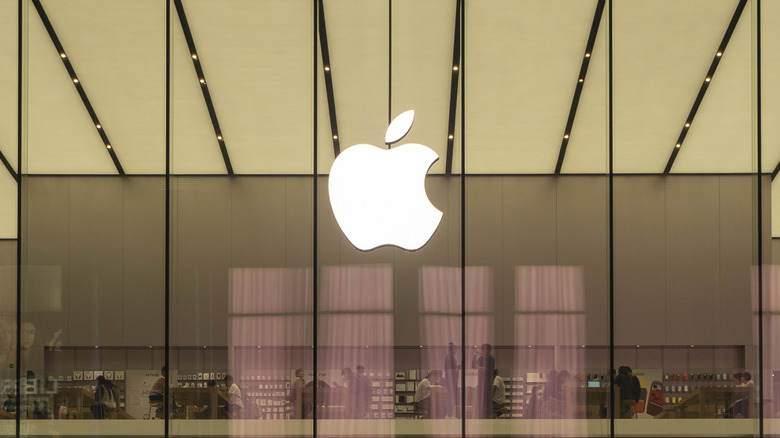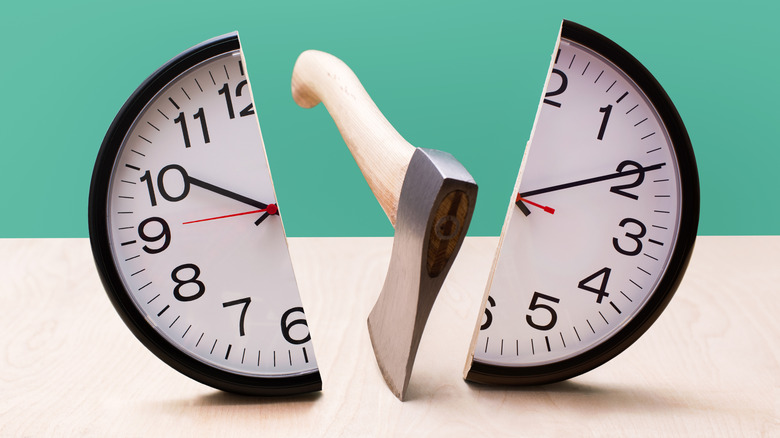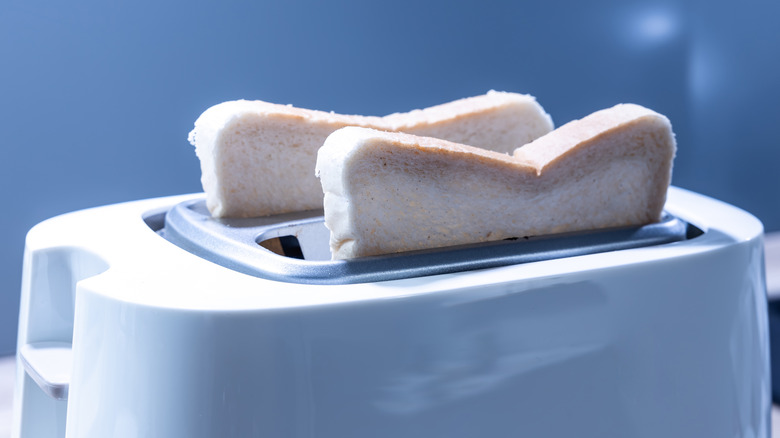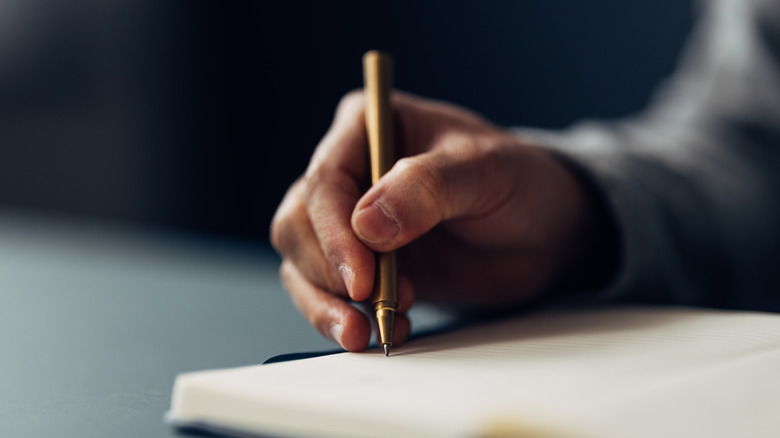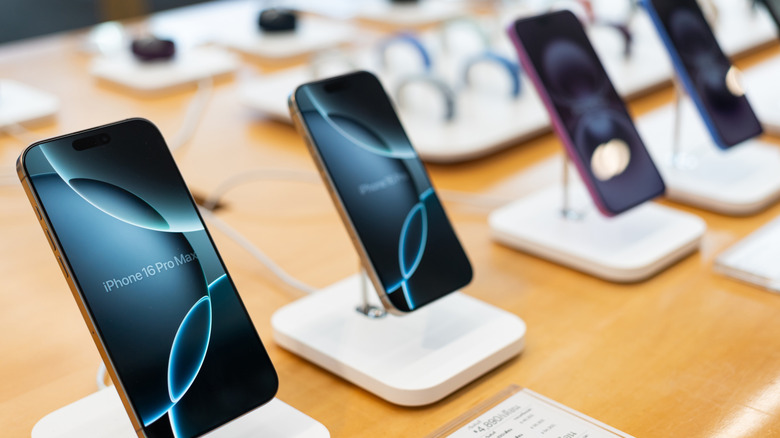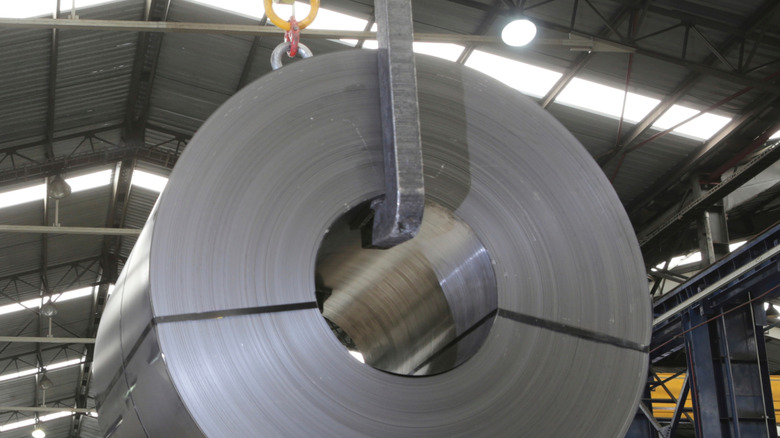The Most Bizarre Job Interview Questions Apple Actually Asked
With its firm, decades-long grip on the technology industry, it's not a stretch to say that Apple is among the world's most recognizable companies. It's also one of the most polarizing: loyal fans line up for hours on the day of a new iPhone launch, while ardent haters criticize its products, the people who buy them, and even the work ethic of Apple's "creative genius" founder, the late Steve Jobs. (Here's what science says it takes to be a genius.) That said, regardless of your opinion about the brand's offerings, it appears as though many hold the company in high regard in terms of being a place of employment. As of mid-2025, it has a Glassdoor employee rating of 4.1 stars, signaling that most of the people who work there say that they "have an excellent working experience." In fact, nearly four out of five Apple employees say that they would recommend their employer to a friend.
If you are considering applying for a job at Apple, it helps to know what to expect before you step in for a job interview. It's not surprising that the company whose most iconic tagline was "Think Different" would take an unconventional approach to formulating interview questions. One well-known example is a question that its job interviewers reportedly ask Specialist candidates: "If you were a pizza deliveryman, how would you benefit from scissors?"
Applicants for other Apple job vacancies have also shared the wackiest questions they've encountered; you'll find some of the most noteworthy ones below.
How many cars are there in the United States?
Considering how the founders of Apple actually met (spoiler: it was a chance encounter involving one of them washing his car in his driveway, and then there's the bizarre story of Apple's unknown third co-founder), it seems oddly appropriate that at least one of Apple's unusual job interview questions would involve vehicles.
This question was reportedly asked of candidates for the Supply Demand Planner position. As understandably daunting as the math may be, it's actually possible to infer a fairly accurate answer to this, based on available statistics on car registration and ownership. As of 2022, there are almost 279 million registered personal and commercial cars in the United States, according to the U.S. Department of Transportation Federal Highway Administration (via Forbes). An easy question if you're a trivia nerd or car ownership statistics enthusiast (which is oddly specific), but not so much if you're just a regular person who wants to get employed.
Fret not, though. It's highly likely that the interviewer who'd ask you this is less interested in getting a serious answer, and more interested in crafting a scenario where you could put your understanding of supply and demand (with respect to the number of people living in the United States) to good use.
What's the most creative way you can break a clock?
This question was reportedly given to candidates applying as Apple interns. Obviously, this question isn't an invitation for you to actually start breaking clocks in the Apple offices. Instead, this is probably meant to measure your capacity to think outside the box — which is a crucial trait for an intern — as well as how you approach answering an ambiguously worded question.
For starters, what does the word "break" mean in this context, exactly? Does it mean you'd have to actually physically destroy the clock (for which there are dozens of ways to do so), or would making it tell the wrong time (or stop telling time entirely) suffice as "breaking"? An analog clock could easily be broken by removing its hands; breaking a digital clock might involve detaching it from its power source. Others might be more impressed by this clever bit of wordplay from a Glassdoor commenter: "I'd clock it one."
That said, you may want to take your internship interview seriously, regardless of how whimsical or silly the questions are. "Apple is such a golden opportunity for interns that it can be extremely choosy about who gets to play in their circular sandbox," shared Mac Consultant Frank Lazar (via Business Insider). "They look for interns with amazing talent, and in their view, if you failed to show evidence of talent the first time around, a little experience somewhere else isn't going to change anything."
Are you smart?
If you've ever applied for a Build Engineer position at Apple, you may have encountered this question during your interview. Like many other job interview questions that fall squarely in the realm of the bizarre, the person who asked you this almost certainly wasn't looking for an accurate self-assessment of your intelligence. And while brains do matter when it comes to performing your job properly, it's far from the only indicator of what would make a good employee. After all, it doesn't take a super-smart person to know that there were many geniuses who were actually terrible people (and depending on who you ask, Steve Jobs himself could be considered one of them).
The more likely explanation behind the inclusion of this question is that the interviewer wants to know how you define the word "smart" — and how your levels of confidence and humility influence the way you perceive yourself, which is arguably a more significant consideration in finding a candidate who could fit in well with the company culture. (And in case you don't have a very high opinion of your intelligence, you might feel better by reading about these supposed geniuses who will make you feel smart.)
How would you test a toaster?
This carb conundrum was reportedly part of the questions asked during interviews for the Software QA Engineer position. Since the job role involves quality assurance and control, an oddball question like this about something so seemingly basic (yet unrelated to the actual job) is likely meant to gauge the candidate's ability to come up with novel yet effective ways to perform standard tasks.
But you might be curious — what would be the proper way to test this delicious breakfast preparation apparatus? That depends on what you mean by "test." If you're a toaster manufacturer, you would take your prototype to a third-party lab that would test the product's durability, energy output, and safety to ensure that it meets the legally set standards for commercial distribution. In the United States, toasters require FCC certification, and thus fall under the regulations of FCC Part 15 (which includes refrigerators and other kitchen appliances).
If you're a consumer or gadget reviewer, on the other hand, you would focus on things like whether it comes with clear instructions, if it heats bread slices evenly, how easy it is to use, and even the color of the toast when it pops out. Don't laugh; breakfast is serious business.
What's more important, fixing the customer's problem or creating a good customer experience?
At this point, having to call customer support for a solution to a tech-related problem at least once in a person's lifetime can be considered a universal experience. And as anyone who has ever had to talk to an agent on the telephone can attest, not all problems end up getting solved, no matter how long you stay on the line. Perhaps that's why Apple included this question in its list of things to ask At Home Advisor applicants.
The option that the candidate will prioritize likely says a lot about how well they understand the job they're applying for — and more importantly, if they'll be a good fit for Apple. After all, the key steps in Apple's "insanely great" customer service involve both "[listening] for and [resolving] any issues or concerns" and "[ending] with a fond farewell and an invitation to return" (via Inc). It's reasonable to think that these would apply not just to in-store representatives, but to customer support via phone as well.
On that note, candidates applying for the position of Apple Store Creative — which involves direct interactions and demonstrations with customers on site — also get asked unusual questions, such as "How would you describe RAM to a 70-year-old man?" And an "odd" question for Part-Time Apple Care At-Home Consultants: "A man calls in and has an older computer that is essentially a brick. What do you do?"
The glass-on-a-turntable question
Here's an interesting question that a Mechanical Engineer candidate encountered during an interview: "You put a glass of water on a record turntable and begin slowly increasing the speed. What happens first: Does the glass slide off, tip over, or does the water splash out?" To answer this conceptual problem (which admittedly has way too many variables to have a single correct answer) requires a working knowledge of fundamental and applied physics.
Fortunately, the person who shared this question on Glassdoor gave a satisfactory response, as confirmed by the interviewers. "Holding rotational [frequency] constant, the water angle will get steeper as its radial location on the record player increases [...] As the angular frequency increases, the glass will either slide, or it will tip over, and which of these depends on the aspect ratio of the glass [...] and the friction between the glass and the record player. Some water could splash out prior to either of those events, if the glass was nearly filled with water before the water angle started to change when the turntable started spinning." Of course, if you have these objects within reach, you can try this experiment yourself; just have a mop (and perhaps your resume?) ready.
If it's any consolation, Product Designer Engineer candidates also get scenario-based science questions (such as "If I have a solid rod and hollow rod with the same mass and I let them slide in a ramp, which one reaches the bottom first and why?").
How would you break down the cost of this pen?
When we encountered this question, we considered the possibility that it might actually be about the Apple Pencil. But since this was a question recorded by a Global Supply Manager candidate in 2013 and the Apple Pencil was released in 2015, it was almost certainly just about a regular ol' pen.
Let's assume that the pen in question is a basic ballpoint pen. Its parts would include the tip, the barrel, and an ink chamber (with springs and thrust components for spring-loaded varieties), which would be made from an assortment of polystyrene, polypropylene, and ABS plastics, as well as stainless steel and aluminum. After manufacturing costs, one would have to factor in the cost of transporting the products, advertising them, and other crucial aspects that are not part of the production process. These aspects and their respective costs are all things that a Global Supply Manager should be aware of.
An arguably more challenging manufacturing-related question is this one, which was asked during interviews with Haptic Hardware Engineer candidates: "List all the possible solutions to make a hole in any metal." They were given two minutes to come up with the answer. Given the job role, it's not a mystery why this would be asked. Still, it's a strange question (and with a time limit, to boot).
If you had to float an iPhone in mid-air, how would you do it?
More often than not, bizarre job interview questions sound and seem bizarre because they aren't meant to have straightforward answers. Take this stumper that Apple interviewers asked Technical Program Manager candidates, for instance. The absurdity of the premise notwithstanding, it's undeniably an interesting question that lends itself well to a range of "correct" answers, depending on the conditions necessary for the solution to be deemed correct.
One Glassdoor commenter nailed it by, ironically, asking the right follow-up questions: "How long would it need to float for? What is [the] minimum required distance from a fixed stationary object that the iPhone would need to meet or surpass for the requirement of 'floating' to be satisfied? Are there any dependencies or blockers that you are aware of initially? By when do you need it to float by, and how many engineers will you be able to grant based on project plan sizing?" For example, if the functionality of the device after the experiment weren't a consideration, one could try using a strong magnet, hypothetically, to make the iPhone "float." On the other hand, if the interviewer meant "float" as in "appear to float," then perhaps an "invisible" nylon cord would suffice.
Ultimately, questions like this are designed to test a candidate's approach to solving unorthodox problems. While this might be obvious, the commenter correctly identified it as a "critical thinking exercise" (and not an attempt from Apple to find telekinetic engineers).
Eenie-meenie-miney-metal (and a drink difference dilemma)
Product Design Engineer candidates certainly get their fair share of weird questions from Apple during job interviews. At least one candidate reported being asked (pertaining to the components of an Apple device), "What are the different ways you can tell if this part is steel or aluminium?"
A rudimentary knowledge of science would inform one's answer in this scenario; for example, a magnet will exhibit a stronger pull on steel (which is a ferromagnetic metal) than aluminum (which is not). Other possible material properties to look into include density, hardness, thermal and/or electric conductivity, and strength. Aside from being a test of science aptitude, this question is relevant to the position because having a good understanding of materials and being able to tell them apart are essentials in product design.
Here's another science-based question, in the form of a practical everyday scenario: "We have a cup of hot coffee and a small cold milk out of the fridge. The room temperature is in between these two. When should we add milk to coffee to get the coolest combination earliest (at the beginning, in the middle, or at the end)?" Interestingly, according to one Glassdoor user who was asked this, "[The engineering director interviewed me, and he liked] the answer at the end.' But he said he wasn't sure, [and he didn't] know the answer to that question either. (Honestly, though, patient souls would probably just wait for the coffee to cool.)
What skills can you bring that other prospective employees can't?
When you walk in for a job interview, it's normal to want to put your best foot forward. It's also equally understandable if you were cautious about making yourself seem too confident in your own skills and values. But when Apple interviews Project Manager candidates, it appears as though they aren't shy about asking applicants why the others in the waiting room wouldn't be able to hold a candle to them. While this question may seem disarming at first, it also actually makes sense: Assuming that only the best of the best apply at Apple, it would be in the best interests of the interviewer to let the candidate themself demonstrate what they think is their strongest and most unique asset.
So, how would one answer this without appearing smug? After all, according to a 2019 study cited by FastCompany, seven out of 10 potential employers prioritize personality when it comes to choosing who to hire; in fact, more of them named this as a key factor than employers who looked at appearance or educational attainment. "If you've got an honest foundation, then everything else will follow," shared Eric Charsky, president of executive search firm Charsky Group, in an interview with BioSpace. He noted that many candidates oversell themselves because "they're trying to get their foot in the door and make themselves look as good as possible." (By the way, here's where Apple's first 10 employees are now.)
